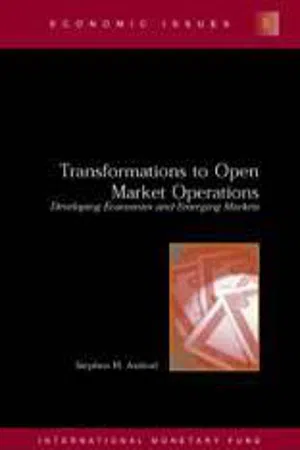
eBook - ePub
Transformations to Open Market Operations : Developing Countries and Emerging Markets
- English
- ePUB (mobile friendly)
- Available on iOS & Android
eBook - ePub
Transformations to Open Market Operations : Developing Countries and Emerging Markets
About this book
NONE
Tools to learn more effectively

Saving Books

Keyword Search

Annotating Text

Listen to it instead
Information
Publisher
INTERNATIONAL MONETARY FUNDYear
1997eBook ISBN
9781557756275Transformations to Open Market Operations: Developing Economies and Emerging Markets
By buying or selling bonds, bills, and other financial instruments in the open market, a central bank can expand or contract the amount of reserves in the banking system and can ultimately influence the country’s money supply. When the central bank sells such instruments it absorbs money from the system. Conversely, when it buys it injects money into the system. This method of trading in the market to control the money supply is called open market operations.
Open market operations are the major instrument of monetary control in industrial countries and are becoming important to developing countries and economies in transition. Open market operations allow central banks great flexibility in the timing and volume of monetary operations at their own initiative, encourage an impersonal, businesslike relationship with participants in the marketplace, and provide a means of avoiding the inefficiencies of direct controls. Developing indirect controls is important to the process of economic development because, as a country’s markets expand, direct controls tend to become less effective, and markets eventually find a way around them, especially in a global world economy. With more countries seeking to deregulate and unleash the potential of market forces, many policymakers and central bankers are grappling with ways to realize the full benefits of open market operations.
For such operations to become part of monetary policy, however, other monetary instruments now in place need to be adjusted and the market infrastructure must be transformed. This paper assesses the options available to a central bank for addressing these matters and designing instruments for implementing open market operations. First, it provides a brief review of the connection between open market operations and other monetary operations. Then, it discusses how the central bank can encourage development of the necessary financial market architecture. Finally, it reviews the advantages and limitations of specific approaches to open market operations.
How Are Open Market Operations Related to Other Monetary Instruments?
Open market operations affect the money supply and related financial measures through their impact on the reserve base of the banking system. As a matter of monetary policy tactics in controlling these reserves, open market operations can be conducted in one of two ways: actively, by aiming for a given quantity of reserves and allowing the price of reserves (that is, the interest rate) to fluctuate freely; or passively, by aiming at a particular interest rate, allowing the amount of reserves to fluctuate. Industrial countries, with well-developed and sensitive markets, normally employ a passive approach, although there have been exceptions. A passive approach also appears to be the norm in emerging markets that have reached a certain level of sophistication. There are advantages to a more active approach in developing countries, however. In such countries, the absence of efficient secondary or interbank markets—to transmit the influence of monetary policy—might be one reason for an active approach. Another might be that the active approach allows the central bank to define its policies more clearly, especially when control of inflation is the overridin...
Table of contents
- Cover Page
- Title Page
- Copyright Page
- Preface
- Transformations to Open Market Operations: Developing Economies and Emerging Markets
- Biography